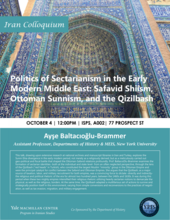This talk, drawing upon extensive research at national archives and manuscript libraries in Iran and Turkey, explores the Sunni-Shia divergence in the early modern period, not merely as a religiously derived, but as a meticulously carried out geo-political and fiscal battle that shaped the Ottoman-Safavid relations profoundly. Prof. Baltacıoğlu-Brammer examines the
formation of sectarian identities -both at the individual and state level- from an often neglected perspective, through the lens of the Qizilbash (“red heads” in Turkish), who constituted the largest Muslim “minority” group in the Ottoman Empire and were the principal catalyst for conflict between the Safavid and Ottoman Empires. She argues that the Qizilbash, as a major source of taxation, labor, and military recruitment for both empires, was a convincing force to dictate -directly and indirectlythe religious and political rhetoric of the era for almost two hundred years, between the 1460s and 1630s. It was during this period when these two mighty empires intensified their religious rhetoric utilizing heavily sectarian notions to demarcate the physical, as well as the religious, borders. At the same time, the Qizilbash adapted a multifarious set of actions to survive and strategically position itself in this environment, varying from simple conversions and reconversions to the practices of negotiation, as well as tax evasion, migration, and military engagement.
Iran Colloquium: Politics of Sectarianism in the Early Modern Middle East: Safavid Shiism, Ottoman Sunnism, and the Qizilbash
Event time:
Friday, October 4, 2019 - 12:00pm
Location:
Institution for Social and Policy Studies (PROS77 ), A002
77 Prospect Street
New Haven, CT
06511
Event description:
Ayşe Baltacıoğlu-Brammer, Assistant Professor, Departments of History & MEIS, New York University

